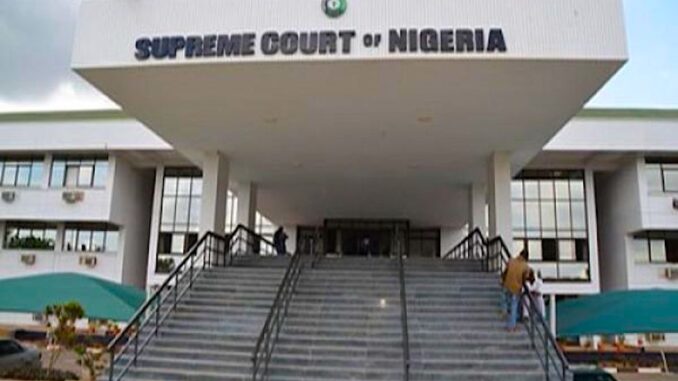
Therefore, no matter the criticism against it, the Supreme Court should not descend into the public arena to join issues with its critics, as it has just done. At all times, it must maintain its equanimity and candour in the face of criticism. Dragging the Supreme Court into public controversy is undignified and unbefitting of their exalted position. Addressing the High Court Journalists Association on December 3, 1964, Lord Denning said: “Justice has no place in darkness and secrecy. When a judge sits on a case, he himself is on trial…if there is any misconduct on his part, any bias or prejudice, there is a reporter to keep an eye on him.” This admonition should constantly be uppermost in the hearts of judges.
However, members of the public should avoid denigrating the Supreme Court, or any other court, unduly, because the judiciary, as an independent arm of government governed by the democratic principle of separation of powers, remains the last hope of the common man. As Lord Hailsham once said while speaking at a banquet in London, there should be some self-discipline in the criticism of judges. Let criticisms be well-informed, well-researched, and temperate.
The Supreme Court must strive to live up to its billings always, as Nigeria’s highest court. Some well-settled principles of law have been made by the current Supreme Court to appear not so settled, thereby ridiculing the principle of stare decisis and lowering people’s confidence in the law. Therefore, the Supreme Court should retrace the path of excellence, honour, and integrity to enhance judicial efficacy and efficiency and to bolster public confidence in the Court. The Supreme Court should be reserved for the best and brightest in character and learning, not for deadwoods or lazybones or corrupt judges. The appointment and elevation of judges to the Supreme Court should be based on merit and high scholarship, not seniority or political patronage.
There should be a departure from the age-long practice of elevating only Court of Appeal Justices to the Supreme Court. Suitably qualified senior lawyers with pedigree and respected academics should be appointed to the Supreme Court to beef up its legal scholarship. The National Judicial Council (NJC), the body responsible for the appointment of judicial officers, is not obliged to appoint Supreme Court Justices from the stock of serving Court of Appeal Justices or abide by the civil service bureaucracy in such appointments. For example, in 1972, Dr. Teslim Olawale Elias was appointed Justice of the Supreme Court all the way from the Faculty of Law, University of Lagos, and he later rose to become the world-acclaimed scholarly Chief Justice Nigeria has ever produced. Justice Augustine Nnamani (of blessed memory) was appointed to the Supreme Court from the Bar. Justice Okay Achike (of blessed memory) was appointed a High Court judge from the academia and elevated to the Court of Appeal and the Supreme Court, respectively, in no distant time. There are more Dr. Eliases, Justice Nnamanis, and Justice Achikes waiting to be appointed to the Supreme Court.
The views of many practicing lawyers, who probably know the candidates better than anybody, should be sought before and even after short-listing the candidates to be considered for elevation to the Supreme Court. Elevation to the Supreme Court must not be used for rewarding political party loyalists or family friends. A Supreme Court Justice must not allow his political leaning to cloud over his sense of justice. He should season his speech, especially his public speech, with the salt of mortification. Disciplinary action against Justices of the Supreme Court should be routinely carried out to salvage the Court from moral degeneracy. Only incorruptible and irreproachable Justices can steer the Supreme Court out of the present muddy water and free of public skepticism.
The Supreme Court justices should be reminded that they are not infallible. The Pope, in his supreme apostolic authority, is said to be infallible when he speaks ex-cathedra on matters of faith and morals. However, the Supreme Court justices are not infallible in their judgments. This is why Justice Chukwudifu Akunne Oputa (of blessed memory) stated in the landmark case of Adegoke Motors vs. Adesanya, that: “We are final not because we are infallible; rather, we are infallible because we are final.” The Supreme Court justices should remember that they are mere mortals and are therefore not immune to committing errors and even miscarriages of justice.
The current Supreme Court Justices should strive for the sterling qualities and integrity of their brother Justices and predecessors at the Supreme Court such as Justices Kayode Eso, Mohammed Bello, Chukwudifu Oputa, Andrews Obaseki, Augustine Nnamani, Anthony Aniagolu, Adolphus Karib-Whyte, George Adesola Oguntade, Muhammad Lawal Uwais, and Niki Tobi among others. Throughout their illustrious stint at the Supreme Court, the aforementioned Supreme Court justices distinguished themselves by their integrity and exceptional brilliance in expounding and expanding the law in accordance with substantial justice. Therefore our current Supreme Court justices should emulate the shining examples of their predecessors at the court.
By their special vocation as unbiased umpires in the dispensation of justice in the highest temple of justice in the land, the Supreme Court justices ought to be the most disciplined officers in the temple of justice. Like Caesar’s wife, they should not only live and behave above board but also manifestly be seen to live and behave above board. Judges are honoured and revered because of their impeccable character. This is why the Supreme Court justices should be cautious in joining issues with their critics in the media and public space, save perhaps to correct or clarify very sensitive issues. The public conduct, public behavior, and public utterances of Supreme Court justices should be seasoned with the ingredients of mortification so as not to erode public confidence in the judiciary or send wrong signals to the public.
END

Be the first to comment